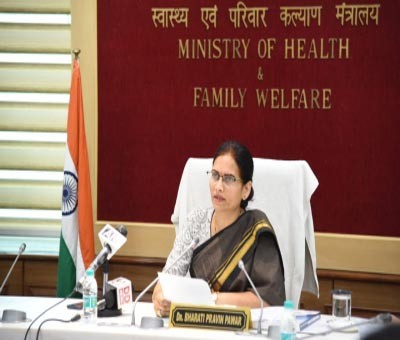
New Delhi, Union Minister of State for Health Dr Bharati Pravin Pawar on Friday said that the lessons learnt in the past indicates that strengthening health systems is mandatory for fighting communicable and non-communicable diseases.
"Effective use of safe and affordable vaccines, diagnostics and devices along with the safe drinking water and maintaining healthy hygiene are important determinants affecting universal health coverage and sustainable development goals", said Dr Pawar while addressing the 16th Asian Conference on Diarrhoeal Disease and Nutrition (ASCODD) at Kolkata.
The delegates from India and other South East Asian countries, African countries, US, European countries joined the conference virtually. The theme of the ASCODD was "Prevention and control of cholera, typhoid and other enteric diseases in low and middle-income countries through community participation: beyond the SARS-CoV-2 pandemic".
Congratulating the Director and team ICMR-National Institute of Cholera and Enteric Diseases for organising the 16th Asian Conference on Diarrhoeal Disease and Nutrition in Kolkata, Dr Pawar said, "Over the years, the ASCODD has expanded the discussions in many dimensions, not only on the epidemiology of cholera and typhoid, but also on enteric vaccine initiatives, antimicrobial resistance, water, environmental and sanitation aspects, molecular diagnostics, food and nutrition etc."
Talking about how COVID-19 pandemic has affected many ongoing public health programmes globally for last two and half years, MoS Health said, "Government of India under the leadership of Prime Minister Narendra Modi has made sure that we provide affordable and quality health to all our citizens. We have taken various initiatives for benefits of citizens with a special focus to reach out to the last person".
Dr Pawar said that the government has always stressed that as public representatives, it is moral responsibility that the services should reach the needy. The needy must not run from pillar to post in search of services. The way Indian Healthcare infrastructure is growing is commendable and the world will witness the changes it brings in the years to come, she added.
She further highlighted various initiatives under Digital India initiative such as Online Registration System, eHospital for hospital management, eSanjeevani telemedicine app so that people could get treatment from the comfort of their homes. She stated that following the principle of Vasudhaiva Kutumbakam the world has witnessed how India successfully ran free vaccination programme for a vast population with record break vaccination of more than 219 crores.
The conference programme focused on the latest issues in enteric infections, nutrition, policy, and Practice including roadmap to end Cholera by 2030, Cholera vaccine development and rapid diagnostics, contemporary perspectives of antimicrobial resistance of enteric bacteria: new Initiatives and challenges, enteric bacterial infections, including Shigella app, epidemiology, burden, and vaccines against other viral infections, including Hepatitis, lessons learned about diarrhoea research during the COVID pandemic.


.jpeg)

